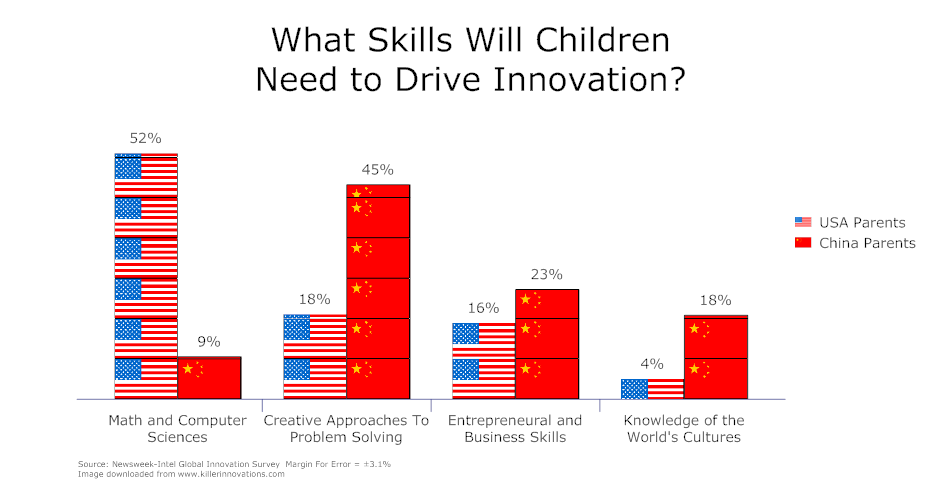US vs China Parents – What skills do children need to be innovative?
During a recent meeting I attended with educators and government officials, I shared my frustration with the “output” of the current educational system. In my opinion, we optimized the system to produce graduates with deep technical skills and the ability to take tests. One competency that I see mis

During a recent meeting I attended with educators and government officials, I shared my frustration with the “output” of the current educational system. In my opinion, we optimized the system to produce graduates with deep technical skills and the ability to take tests. One competency that I see missing in our children is the ability to apply creative problem-solving skills to any given problem.
The Creative Economy
If you believe, as I, that we are experiencing the transition to the creative economy, the ability to train future employees with innovation skills will determine the winners and losers for organizations and countries. Those with a workforce without innovation skills will be relegated to being producers rather than creators.
I don't want to sound like I'm blaming educators. The ultimate responsibility falls on the parents for the education and training of their children. So what skills should parents ensure their kids? A recently published report based on the Newsweek-Intel Innovation Survey shows that US and China parents don't agree on what skills are critical for children to have when it comes to innovation.

So, what are these critical skills?
Creative Thinking/Problem-Solving Skills: Children need to be taught how to think rather than how to memorize. It's not about finding the one right answer for a test but instead the ability to search out all the possible answers to a question to find the optimal solution. Critical thinking and problem-solving skills should not be a stand-alone subject but taught across all subjects. For example, thinking through the range of options a given historical figure faced and then determining what would have been the alternative outcomes. Did that person make the right decision?
Entrepreneurial Skills: It is no longer about having deep expertise in an area but also having a broad understanding of how an idea is transformed into innovation. Understanding the structure, steps, and running of an organization is a fundamental skill that everyone needs to have.
Cultural Understanding: The world is flat and getting flatter. The ability to understand and collaborate with a global ecosystem of employees, partners, and customers is a table stake. Without them, you are at a distinct disadvantage that will become more severe.
What are parents to do?
Find opportunities for your kids to gain the experience and skills needed to win the emerging economy. Get them involved in Junior Achievement so they understand business and how to be an entrepreneur. Get them on a FIRST team so they learn how to invent, create and collaborate. Put them in situations where they have to work with others from different cultures, such as an international internship.
While we as a society need to change the educational system to ensure we are producing the best employees possible, it's the parents that can have the most positive and immediate impact on instilling innovation skills.
What jobs will they be ready for when the creative economy takes over?
Phil McKinney Newsletter
Join the newsletter to receive the latest updates in your inbox.




